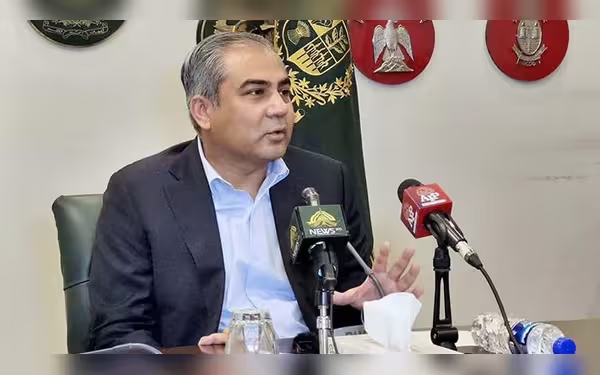Saturday, November 16, 2024 05:36 PM
PTM Ban Sparks Controversy: Mohsin Naqvi's Meeting in Peshawar
- PTM banned under Anti-Terrorism Act 1997.
- Mohsin Naqvi to address KP government's concerns.
- Provincial government emphasizes law and order.
 Image Credits: geo
Image Credits: geoThe PTM ban has raised concerns in KP, prompting Mohsin Naqvi's meeting to address tensions and ensure law and order.
The Pashtun Tahafuz Movement (PTM), a group advocating for the rights of Pashtuns in Pakistan, has recently been banned by the federal government. This decision has sparked significant controversy and concern, particularly in Khyber Pakhtunkhwa (KP), where the PTM has a strong following. The ban was announced on October 6, 2023, under Section 11B of the Anti-Terrorism Act 1997, with the government citing the group’s activities as a threat to peace and security.
In response to this ban, Interior Minister Mohsin Naqvi is scheduled to visit Peshawar today to attend a crucial meeting at the Chief Minister's House. This meeting aims to address the KP government's concerns regarding the federal government's decision. Chief Minister Ali Amin Gandapur confirmed that Naqvi's visit is part of efforts to find a peaceful resolution to the tensions arising from the ban.
During a joint meeting with members of both the treasury and opposition benches, Chief Minister Gandapur expressed the provincial government's reservations about the ban. He stated, “The federal government’s decision to declare the Manzoor Pashteen-led PTM a proscribed organisation has triggered tensions in the province.” This highlights the delicate balance the provincial government is trying to maintain amid rising political instability and security challenges in the country.
Furthermore, the KP government has announced its commitment to strictly enforce the ban on the PTM. In a video statement, spokesperson Barrister Saif emphasized that the group is involved in activities against the state and the constitution, which justifies the prohibition on political gatherings or rallies in the province. This stance reflects the provincial government's determination to uphold law and order while navigating the complexities of political dissent.
As the meeting unfolds today, it is crucial for all parties involved to engage in constructive dialogue. The situation calls for a consensus-based approach that respects the rights of citizens while ensuring the safety and security of the province. The outcome of this meeting could set a precedent for how the government handles similar movements in the future, making it a pivotal moment in Pakistan's political landscape.
The ban on the PTM and the subsequent meeting in Peshawar underscore the ongoing challenges faced by the government in addressing political dissent and maintaining stability. It is essential for the authorities to listen to the concerns of the people and seek solutions that foster peace and unity in the region. As the situation develops, it will be important for citizens to stay informed and engaged in the democratic process, ensuring that their voices are heard in the face of governmental decisions.













